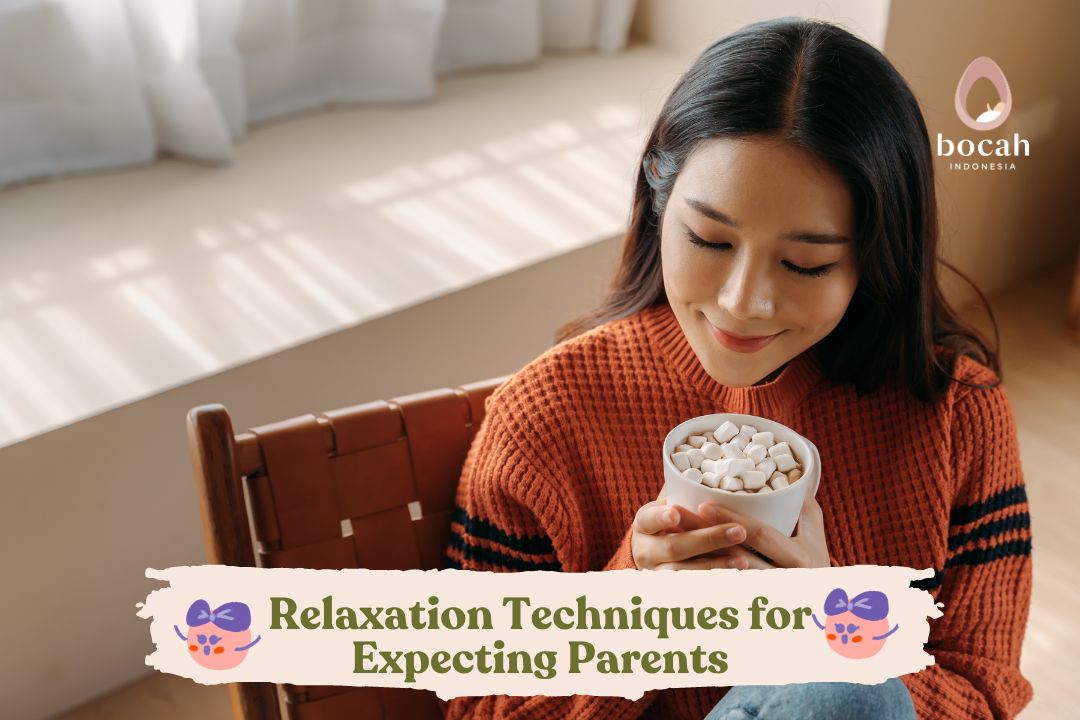Happy Mind, Calm Birth

Becoming a parent is both exciting and nerve-wracking. Learn relaxation techniques for expecting parents here.
Feelings of anxiety about becoming a parent are normal, and many parents-to-be experience the same emotions.
There’s no denying that the journey to parenthood is full of challenges and changes.
However, don’t let the anxiety linger, as it can affect the baby growing in the womb. Instead, expecting parents can try these calming relaxation techniques to ease their minds.
Relaxation Techniques for Expecting Parents
To help expecting parents ease their anxiety about the new role, it’s a good idea to try relaxation techniques like meditation. Meditation is a way to calm the mind through physical and mental exercises.
There are various types of meditation, each with different goals. Some forms of meditation can help parents-to-be stay calm when thinking or making decisions. Here are the types of meditation:
1. Mindfulness Meditation
Mindfulness meditation involves focusing on what is happening right now without getting caught up in thoughts about the past or future. You can start by sitting comfortably and paying attention to the overall sensations in your body.
This can be done by focusing on your breathing, feeling sensations in certain parts of your body, or even listening to sounds and smelling scents around you. If your thoughts start to wander to the past or future, gently bring your attention back to the physical sensations you’re experiencing at the moment.
2. Mantra Meditation
Mantra meditation involves repeating a specific phrase or sound to help calm the mind and achieve a meditative state. You or your partner can choose a simple, meaningful mantra such as “relax” or “calm.”
During meditation, repeat the mantra regularly, either aloud or in your mind, while continuing to focus on your breathing or body sensations.
3. Movement Meditation
Movement meditation combines physical activity with mental focus. You can meditate while walking, paying attention to each step and the sensation of your feet touching the ground. You can also focus on specific body movements, such as during yoga or tai chi, allowing the movement to become a focused meditation.
4. Body-Centered Meditation
Body-centered meditation focuses on the physical sensations felt within the body. This can be done by systematically scanning the body, paying attention to each part from head to toe.
You may observe sensations such as warmth, cold, tension, or relaxation in each part of the body without judging or evaluating them. This helps to increase body awareness and reduce stress.
By understanding these different types of meditation, you can choose a technique that best suits your needs and personal preferences to gain the most benefit from meditation practice.
Each type of meditation offers unique benefits, but they all aim to provide calmness and peace of mind. Try different forms of meditation and find the one that feels most comfortable and suitable for you.
Benefits of Meditation During Pregnancy
The benefits of meditation during pregnancy are varied, including:
1. Reducing stress
Pregnancy can be a joyful time, but it can also bring stress and anxiety. Meditation has been shown to help reduce stress and anxiety levels during pregnancy. A study found that pregnant women who practiced meditation reported less anxiety and fewer negative emotions, such as shame and depression.
2. Reducing the risk of premature birth
Premature birth can increase the risk of health issues for the baby. Some studies suggest that meditation, including practices like yoga, can reduce the risk of premature birth by lowering stress in pregnant women.
3. Healthy baby
Research also shows that calm and mindful parents can positively influence a baby’s development after birth. Pregnant women with high mindfulness levels tend to have babies who are more capable of staying calm, adjusting to new environments, and controlling their attention and behavior.
However, it’s important to note that not all studies show a clear link between meditation and healthier development, and the benefits of mindfulness can diminish if the mother stops practicing meditation. Therefore, consistency in meditation practice is essential to maintain the positive effects on mental and physical health during pregnancy.
How to Meditate During Pregnancy
Here are ways to meditate during pregnancy:
- Choose a quiet and distraction-free spot in your home for meditation. Turn off your phone and ensure you won’t be disturbed for a few minutes.
- Pick a comfortable position, whether sitting in a cozy chair, leaning against the wall, or sitting cross-legged on the floor with a cushion under your hips if needed. Make sure your body feels relaxed and not tense.
- Focus your attention on your breathing. Breathe slowly and deeply, feel the air entering and leaving your body. If your mind starts to wander, gently bring your focus back to your breathing.
- Try to imagine your baby in the womb, a healthy and happy baby. You can also picture a calm and peaceful place in nature to help relax your mind.
- Reflect on the things you are grateful for in life, including your pregnancy. Focus on positive thoughts and make room for feelings of gratitude during meditation.
Use empowering affirmations. - Choose phrases that are meaningful to you, such as “I accept and love my pregnant body with full love and care.” Remember, meditation is a continuous practice, so don’t be too hard on yourself if your mind easily wanders or if you find it difficult to stay calm.
- Take time each day to meditate, even if only for a few minutes. With consistency and practice, you will start to feel the benefits for both your well-being and your baby’s well-being during pregnancy.
If you still find it difficult to control your thoughts and anxiety during pregnancy, don’t hesitate to seek professional help, such as a psychologist. Find more information about pregnancy programs or IVF programs on Bocah Indonesia’s website.
Source:
- Altazan, A. D., Et Al. (2019). Mood And Quality of Life Changes in Pregnancy and Postpartum and The Effect of a Behavioral Intervention Targeting Excess Gestational Weight Gain in Women with Overweight and Obesity: A Parallel-Arm Randomized Controlled Pilot Trial. BMC Pregnancy And Childbirth, 19(1), pp. 1–12.
- Rajeswari, S., & Sanjeevareddy, N. (2020). Efficacy of Progressive Muscle Relaxation on Pregnancy Outcome Among Anxious Indian Primi Mothers. Iranian Journal of Nursing And Midwifery Research, 25(1), pp. 23.
- Raising Children Network Australia (2022). Healthy Relationships with Partners in Pregnancy.
- Cohen, M. Parents (2023). A Guide to Emotions and Mood Swings During Pregnancy.
- Moore, J. Webmd (2022). What To Know About Meditation During Pregnancy.




